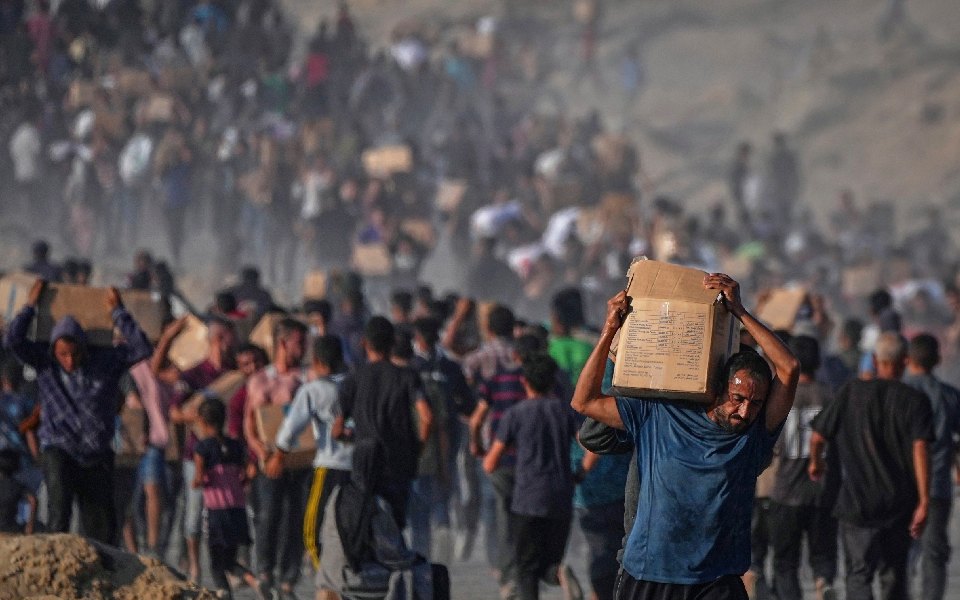Brussels: The European Union has acknowledged “indications” that Israel may be breaching human rights obligations in Gaza, according to a confidential document leaked to The Guardian. While the document stops short of recommending sanctions, it marks a critical turning point in EU-Israel relations.
Prepared by the EU’s foreign policy service and set to be presented by foreign policy chief Kaja Kallas, the document states that Israel could be in violation of Article 2 of the EU-Israel Association Agreement. That agreement, signed in 1995, forms the backbone of a €68 billion trade relationship between Israel and the 27-member bloc.
The Guardian reports that this internal paper draws upon findings by the International Court of Justice, the UN High Commissioner for Human Rights, and other international bodies. However, it clarifies that the assessment does not reflect a formal value judgment by any EU official.
The review was initiated after 17 EU member states, including the Netherlands, a traditionally close ally of Israel raised concerns over Israel’s military actions and blockade in Gaza. Since October 2023, more than 55,600 Palestinians, mostly civilians, have been killed, according to the Gaza Health Ministry.
Despite EU Commission President Ursula von der Leyen’s reiteration of Israel’s right to self-defense during its conflict with Iran, criticism has grown over Europe’s muted response to the humanitarian crisis in Gaza. More than 100 civil society organizations, including Amnesty International and Human Rights Watch, recently urged the EU to suspend the agreement, warning that continued trade without action would “destroy” the EU’s credibility.
In an earlier commentary reported by The Guardian, Amnesty’s EU head Eve Geddie said the review had come “tragically, devastatingly late,” accusing Israeli forces of growing more emboldened over time.
The political divide within the EU continues to hamper decisive action. Full suspension of the agreement would require unanimity, a highly unlikely outcome due to expected vetoes from countries like Hungary, the Czech Republic, and Germany. Even partial suspensions, such as barring Israel from the Horizon research programme (from which it has received €831 million since 2021), remain uncertain.
A separate letter from eight EU countries, led by Belgium, also urged the EU to halt trade in goods from Israeli settlements in occupied Palestinian territories. That request stems from an ICJ advisory opinion last year calling on all states not to recognize Israel’s occupation as lawful.
As The Guardian highlights, the push for a policy shift gained momentum last month following mass protests in the Netherlands. The Dutch foreign minister, Casper Veldkamp, declared Israel’s blockade of Gaza to be in violation of international law and urged a reassessment of the EU-Israel agreement.
Despite these developments, internal EU disagreements persist. In statements covered by The Guardian, Kaja Kallas noted that while she sympathised with demands for action, sanctions require unanimity. “Sanctions that will not pass only highlight our lack of unity,” she said.
Let the Truth be known. If you read VB and like VB, please be a VB Supporter and Help us deliver the Truth to one and all.
Bengaluru (PTI): The Karnataka government has issued directions to municipal corporations across the state to regulate and prohibit feeding pigeons in public places, citing serious public health concerns.
Deputy Secretary to Government V Lakshmikanth has written to the Urban Development Department requesting it to issue directions to the Greater Bengaluru Authority (GBA) and all municipal corporations to take immediate steps to implement the measures.
In an official note dated December 16 issued by the Health and Family Welfare Department and released to the media on Wednesday, the department said uncontrolled feeding of pigeons in public places has resulted in large congregations of birds, excessive droppings and serious health concerns, particularly respiratory illnesses linked to prolonged exposure to pigeon droppings and feathers such as hypersensitivity pneumonitis and other lung diseases.
ALSO READ: Chinese GPS tracker found on seagull near Karwar Coast
"The commissioner, the Greater Bengaluru Authority and the Commissioners and chief officers of other municipal corporations shall take necessary action to mitigate the causes of dangerous disease spread by pigeon and enforce specified guidelines in their respective jurisdiction," the note said.
According to the department, these include a prohibition on feeding pigeons or causing pigeons to be fed in areas where it may cause nuisance or pose a health hazard to the public. Pigeon feeding shall be permitted only in designated areas in a controlled manner, subject to certain conditions.
"The designated areas may be selected in consultation with stakeholders. The responsibility for upkeep of the designated areas and compliance to the directions shall be taken up by some charitable organisation or an NGO. The feeding in designated areas shall be permitted only for some limited hours in the day," it said.
The note further stated that authorised officers of local authorities shall issue on-the-spot warnings and may impose fines for violation of the order, or lodge complaints to prosecute offenders under Sections 271 (Negligent act likely to spread infection of disease dangerous to life) and 272 (Malignant act likely to spread infection of disease dangerous to life) of the Bharatiya Nyaya Sanhita.
It also directed local authorities to conduct public awareness campaigns, including the display of signboards, banners and digital messages, explaining the health hazards associated with pigeon droppings and feathers, the content of the regulatory directions and penalties for violations, and alternative humane methods of bird conservation that do not endanger public health.





